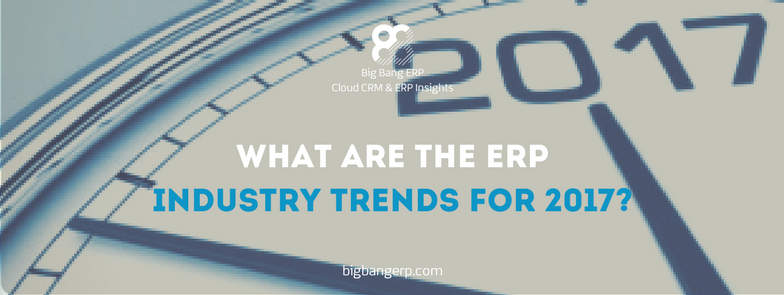Enterprise Resource Planning has come a long way since it was first introduced in the middle of the 20th century as a production planning tool for manufacturers. Many of the world’s major enterprises use ERP systems for their business needs, and in recent years they have become popular with small and medium enterprises as well.
The face of ERP is changing rapidly, and by keeping up with the latest industry trends, you can find ways to maximize your business potential.
Here are some of the ERP industry trends to look out for in 2017.
1. Prediction analysis
Data has been part of ERP for a long time, but it has largely been used to report the status of things that have already occurred. However, with advances in data analysis and business intelligence, predictive data is becoming popularly used to forecast future trends as well. This can be very useful for marketing teams in particular. Data is only really valuable to a company when it’s used for something: by analyzing data to better understand the past or predict the future, businesses are equipped to make well-informed decisions for success. They are more likely to notice even subtle shifts, and understand the future impacts that these may have.
2. Cloud ERP
In this day and age, a lot of business is done outside of the office; for example, staff may be at a worksite or a meeting and need to access information that they would once have had to get emailed to them by someone at the office.
The cloud has made ERPs more accessible, so that you’re no longer chained to your desk, and you can get the information you want while on the go.
Some ERPs exist only on the cloud (for example, web-based ERPs), but many companies choose to use traditional ERPs that are simply hosted on the cloud for easy access; this allows companies to continue using their preferred ERPs, but with the freedoms that cloud functionality offers. Some ERPs have a hybrid offering of cloud and non-cloud services.
One notable benefit of cloud-based ERPs is the lack of infrastructure required to run them; no software or hardware is required, and they are scalable for growth – you pay for what you use, so your return on investment is faster.
3. Customization
Customization has traditionally been quite expensive; ERPs are designed to work out-of-the-box, but every business is different, and there may be business functions that are not covered by an ERP; alternatively, the way that business functions are conducted may change. This often resulted in large costs being involved just to change a button or two, or in enterprises creating systems outside of the ERP to handle their unique business needs (which somewhat defeats the purpose of the ERP as an integrated system).
However, in recent years, prices have become more competitive, especially with the entrance of many smaller ERP providers on the scene, including cloud providers. This has led to traditional ERPs becoming more flexible with customizations, and connection of outside applications into the ERP.
4. IoT (Internet of Things)
The Internet of Things has become a part of everyday life – from your Fitbit linking to your computer to record your exercise for the day, to security systems that are hooked up to the Internet and send notifications to your phone. IoT has plenty of potential for application in the ERP industry as well: for example, internet-connected machines can communicate faults directly to the manufacturer, so that the faulty machine or parts can be repaired or replaced; data can be sent from devices to the ERP for analysis, which can be used for reporting or forecasting; performance metrics can be used to optimize logistics, and so on.
As the way we do business evolves, so do what enterprises require from their ERPs. Choosing an ERP that fits the needs of your specific business can be a complex task, especially when there are so many options on offer. Big Bang ERP has many years of industry experience and can help streamline this task, so that you can get back to work on your core business while making the most of what the ERP industry has to offer.



